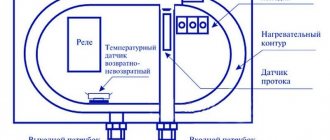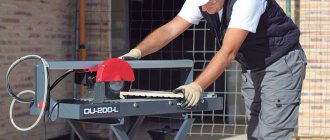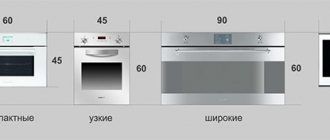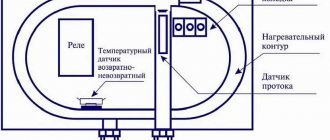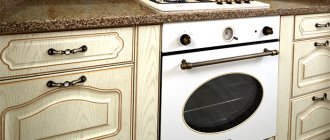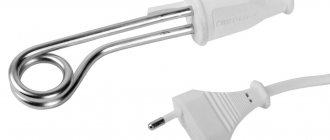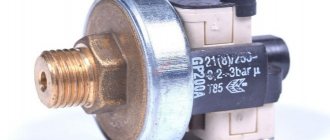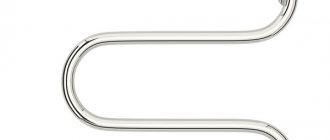Which is cheaper - gas or electric water heater?
The cost of the equipment, if we take into account the column and storage boiler, which are approximately the same in build quality, are at different price levels. Pricing is significantly influenced by the “promotion” and popularity of the brand.
An electric storage water heater TERMEX will cost from 5,000 rubles, a BOSCH water heater will cost from 9,500 rubles. A instantaneous water heater from Timberk costs from 2800 rubles. There are many options for geysers on the market that cost much less, presented in budget versions.
In addition to the cost, when choosing whether a gas or electric water heater is cheaper, you should take into account the cost of installation, service, obtaining permits for connection, etc.:
- Connection - an electric water heater differs from a gas water heater in that a project is not needed for its installation. A storage or flow-through electric boiler is as safe as possible. Electric water heating equipment can be installed in any room, regardless of the purpose and size of the room.
Installation work on a storage electric boiler Tank volume (l) Installation cost (RUB) 10-15 2500 30 3000 50 3500 80-100 4000 from 100 4500 Installation work for a flow-through electric boiler Power, kWt) Installation cost (RUB) until 3 1500 from 3.1 to 5.5 1800 from 5.6 2300 Gas equipment must be registered. If the highway is not connected to the house, then the project and installation work can cost up to 300,000 rubles. Estimated cost of installation work in the apartment:
Services list Cost from (RUB) 1 Call a specialist 300 3 Installation of a geyser 2500 4 Setting up and starting a gas boiler 2200 5 Installation of a combustion products exhaust system (for one segment, including material) 800 6 Installation of a smoke exhaust system for reinforced concrete (for each element, together with the material) 500 8 Tying the geyser with polypropylene or metal-plastic pipes 400 9 Installation of shut-off valves on a gas pipe 500 10 Removing an old gas boiler 400 - Maintenance - the storage tank and column must be inspected every year, performing minor repairs. The magnesium anode in an electric water heater needs to be changed, and the heat exchanger in gas equipment must be cleaned of scale. Service costs vary. The price is largely influenced by the distance of the official representative office of the manufacturer from the place of residence of the owner of the water heating equipment, as well as the territorial affiliation of the water heater brand. German equipment will be more expensive to repair than Korean or Italian equipment.
The price of a gas water heater is affected by the presence of additional functions: automatic ignition, flame modulation, the ability to operate on liquefied gas, a programmable control unit.
As for electric storage boilers, the cost depends on the type of anti-corrosion protection and internal coating of the container. Stainless steel tanks equipped with titanium (instead of magnesium anode) rods will cost the most.
Practice shows that of the two options for heating water (using electricity or gas), apartment owners often choose the one that is cheaper. Preference is given to equipment with compact dimensions. The advantage of gas water heaters over storage electric water heaters is that they are small in size and can easily fit even in a small kitchen. As for the flow-through electric boiler, it, having a relatively low cost, loses to the analogues described above due to uneconomical energy consumption.
This is interesting: Rating of the best electric pancake makers of 2021 (TOP 10)
Security questions
For GC - drawing up design documentation for connection and use, annual control of smoke exhaust, the need for monthly service. If any deviations are detected, the mechanism is immediately deactivated.
The recommendations of the craftsmen must be followed before installation; the area of the boiler room and the height of the upper railings are also taken into account. Attention is drawn to the standards associated with the location of the ventilation shaft. The reason for such a commotion and collection of documents is the increased risk of methane leakage, which will lead to an explosion. Gas service inspectors simply refuse to install a gas boiler because the boiler room or apartment does not meet the technical standards for starting.
Interesting: Installing a food waste disposer for your sink
The electrical system is not hazardous to health. There is no need to coordinate actions and obtain permissions. Care must be taken to prevent electric shock. A special machine, an RCD and a resistor are mounted.
To compare the two mechanisms again, pay attention to the table data:
| System type | pros | Minuses |
| Gas flow installation |
|
|
| Electrical installation |
|
|
How does a gas water heater work?
The operating principle is similar to a flow boiler. The device heats the stream as it flows inside the device, without accumulating in it. Water goes to the gas water heater through the incoming pipe → passes through the heat exchanger → heats up → exits to the user through the mixer. Carbon monoxide is removed from the column through a chimney - in chimney models. Turbocharged ones remove combustion products through a coaxin pipe without burning the air in the room.
The productivity of the device is determined by the temperature difference at the time of heating. The water should be 25°C warmer than what enters the column. If the productivity of the unit (for example, Bosch Therm 4000 OW 10-2 P) is 10 l/min, then it will heat up within 10 liters in 1 minute.
In order for the stream to warm up well when the taps in the kitchen and bathroom are turned on at the same time, it is better to take a column with a output of 15 l/min. The same Bosch Therm 4000 O WR 15-2 P, for example. It has a heat exchanger made of oxygen-free copper, which does not contain lead or tin impurities. This means that the device will work properly (no wonder it comes with a 2-year warranty from the manufacturer) and will not harm the health of household members.
Note: Design and principle of operation of a geyser: 10 features and operating rules
Advantages of a geyser
The main and indisputable thing is that hot water heats up instantly, at the click of ignition, and in unlimited quantities.
Secondary and controversial is the low cost of operation. Although, if the apartment does not have a gas supply and you do not have an agreed upon project and permission from the gas service, there will be no business. You understand what this entails.
If you are the lucky one who is allowed to install a geyser, consider the “pros” according to three parameters in order to choose a suitable unit.
Ignition type
There are three types, and they significantly affect the quality of using the speaker.
- The automatic ignition is the most convenient. We opened the tap, the column turned on automatically and immediately began to heat the water. The main thing is that the pressure is good, otherwise the device will not work.
- Piezo ignition is the most wasteful in terms of fuel economy. The fire will have to be ignited manually by pressing the button. The burner must be kept on constantly to wash dishes, take a shower or wash clothes. You won't save gas with this situation.
- In this regard, electric ignition is much cheaper: both in terms of the cost of the unit and in terms of performance indicators. The flame is started by a spark. It stays on while you use the water, and goes out as soon as the water in the tap is turned off. Gas is consumed in doses. The only thing you have to spend money on is batteries. The boiler is powered by them.
Temperature
In automatic and semi-automatic machines, it is easy to adjust the gas supply force. There is a lever on the instrument panel that reduces or increases the flame. Everything is logical here: if you increase it, it will heat more strongly, if you decrease it, it will heat less. You just need to understand that a powerful flame leads to excessive gas consumption. A barely flickering light may not turn on the speaker.
We should not forget: after adjusting the burning power of the fire, you need to change the water pressure.
Interesting article: Which speaker is better - automatic or semi-automatic: 4 steps to understanding
Tank (heat exchanger) material
It is like an indicator of quality. Especially in places of adhesion. If the lines are pronounced, it is better to abandon the device. It will probably break or start leaking in a year or three.
When choosing a gas appliance, it is better to focus on the specific color and shine. If the column is painted with heat-protective paint, it is a low-quality device.
Look at what the heat exchanger is made of - the wear resistance of the gas column depends on it:
- steel - expensive, but reliable. Does not rust, with moderate thermal conductivity;
- Purified copper has even greater heat transfer than steel. She will extract the maximum from every cubic meter of gas;
- copper with impurities heats up unevenly. Such a heat exchanger becomes unusable relatively quickly.
Cost-effectiveness of a geyser
The speaker is only beneficial if it is turned on for a long time. The peak load occurs at the beginning of operation - when the heat exchanger heats up. Afterwards, the consumption of blue fuel is less.
This is a better option than endlessly pulling the lever to turn on the hot water to wash your face or rinse your plate. Then there will be no savings.
Water heaters - gas or electric?
A water heater can be of two types: electric or gas. An electric water heater can be of two types:
| Electric water heater diagram: 1 - cold water supply, 2 - hot water supply, 3 - thermostats, 4 - heating elements, 5 - anode |
— electric instantaneous water heaters; — electric storage water heaters.
A gas electric heater can be:
— gas instantaneous water heaters (gas water heaters); — gas storage water heaters
The choice of a particular water heater depends on several factors. For example, for an apartment in the city where the water is turned off for a short time, we choose a storage heater with a capacity of no more than 100 liters or a low-power instantaneous water heater. If the task is to choose a water heater for a large country house, we use more serious models, because the water temperature here is much colder and, of course, there is greater water consumption.
Electric water heater
Electric water heaters are very popular water heaters. Electric heating elements (heating elements) are also simple in design. Such electric heaters are connected to the power supply and the only difficulty may be installing devices with separate electrical wiring and individual fuses.
Tanks - water heater reservoirs are made of steel, and the inner wall is protected by anti-corrosion enamel. An anode is needed for additional protection against corrosion. The thermal insulation of the tank reaches a thickness of 100 mm and the material for it is environmentally friendly polyurethane foam.
Storage electric water heater
| Instantaneous electric water heater | Storage electric water heater |
Instantaneous electric water heater
In instantaneous water heaters, water is heated as it passes through a heat exchanger. In order for water to flow like from a tap, you need a voltage of 3x380 volts and a 12-30 kW instantaneous water heater. Keep in mind that a good electric water heater will be large in size and consume a lot of electricity, which is an additional expense. Moreover, the more water the water heater heats, the lower its temperature.
Storage electric water heater
This version of the water heater - boiler is used when electrical power is limited. Since heating occurs gradually and can often be connected to an ordinary outlet. This device heats a certain volume of water to 55-75 0 C and has the ability to automatically maintain the temperature at a set level.
| Gas water heater diagram: 1 - cold water supply; 2 - hot water selection; 3 - thermostat; 4 - gas burner; 5 - anode | Gas instantaneous water heater (gas water heater) |
Gas water heater
The energy used in such water heaters is gas. In this case, geysers use the flame of a gas burner to heat the water flowing through a copper heat exchanger. This water heater raises the water temperature by 50°C. A gas storage device clearly looks like this: firstly, there is a container for heating water using a gas burner. Cold water is supplied through a tube to the bottom of the tank, and hot water is taken from the top. The magnesium anode should be changed approximately once a year.
The advantage of gas water heaters is their efficiency, since gas is cheaper for electricity. Depending on the power, it is capable of dispensing from 5 to 17 liters of hot water per minute - about the same amount you can get by opening a water tap. Most modern gas water heaters have automatic electric ignition of the flame, plus the water heater is safe if the pilot burner flame goes out or if the chimney malfunctions, since the operation of the column is blocked.
The disadvantage is the installation of a water heater, because a special gas supply and ventilation system are required to remove gas combustion products.
All geysers - instantaneous water heaters consist of a burner that heats the water and automation that ensures safe operation. Depending on the power consumption, water heaters are divided into the following groups:
- low power (17 - 19 kW); - average power (22 - 24 kW); - high power (28 - 30 kW).
Table. Gas water heater water consumption
| power, kWt | Consumption when heating at 50 °C | Consumption when heating at 25 °C |
| 19 | up to 5 l/min | up to 11.5 l/min |
| 24 | up to 7 l/min | up to 14 l/min |
| 28 | up to 8 l/min | up to 16 l/min |
Also, geysers differ in the type of ignition for water heaters:
| Gas storage water heater |
— with piezo ignition; — with electric ignition; — HydroPower.
Piezo ignition is performed in water heaters by pressing a special button. Electric ignition is carried out in the columns when the hot water tap is opened. They are more economical because there is no pilot light constantly burning. HydroPower - in water heaters of this type, the current to ignite the burner is produced using a turbine driven by a water flow.
Gas storage water heater
The advantage of gas storage water heaters is a large supply of water. The disadvantage of such a water heater is the rather high price and difficulties with installing gas equipment, but this pays off due to the cost of electricity. Gas water heaters are available in two types:
- with natural draft - with an open combustion chamber; - with forced draft - with a closed combustion chamber
Water heaters of the first type do not require additional air flow into the room to support the combustion process; for such water heaters there is no need to build an expensive traditional chimney, but a short, inexpensive coaxial one is suitable.
What is better at home: a gas water heater or a boiler: comparison table
| Water heater | Geyser | |
| Energy efficiency | Energy-intensive. The storage tank constantly draws electricity to heat the water and maintain the desired temperature. | Fuel consumption is dosed: it heats water only when it flows from the tap |
| Indirect heating consumes up to 27 W/h | ||
| Difficult to install and connect | Installation in the hands of a master is not difficult. | Permission from gas and fire services and a project agreed upon with specialists are required. |
| No permits required | Fire hazardous. | |
| Cannot be installed in the bathroom | ||
| Useful functionality | Hot stream under any pressure. | Warms instantly, in unlimited quantities or as much as needed. |
| Safer than a geyser. | The flame can be adjusted. | |
| Can be hung vertically or horizontally, or placed on the floor. | Longer service life than a boiler | |
| Device cost | from 1,919 to 11,120 UAH | from 2,959 to 21,255 UAH |
| (at Moyo.ua) |
As you can see, the question: “Which is better - a boiler or a gas water heater?” is in itself incorrect. If you have an apartment in a house equipped with electric stoves, there can be no talk about gas appliances. Owners of apartments with a gas pipeline have something to think about:
- The dispensers consume little blue fuel and heat water as much as needed. But the hassle with permission, approval and installation of equipment will not end. You will have to stock up on patience, free time and funds to go and achieve results;
- boilers are more energy-consuming, but not whimsical. It is easy to install, installation permits are not needed, they operate quietly, are not explosive, and can be turned off if not needed.
Decide. Choose the right unit. The last word is yours.
Useful article: TOP 5 best manufacturers of geysers
How does a boiler work?
An electric storage water heater operates on the principle of a thermos. Maintains the preset temperature of water supplies and periodically warms them up.
This is a simple device that consists of a tank with good thermal insulation, a heating element - hidden in a flask or directly in contact with water, and a temperature sensor located on the panel. The main thing here is to choose the appropriate volume:
- If you take a tank of up to 50 liters, you risk constantly suffering from a lack of boiling water;
- and if you buy a huge one with a capacity of 150-200 liters, you will overpay for electricity.
Flow models are the absolute opposite of storage models. They heat water instantly and in unlimited volume. But if you open the faucet in the bathroom and the kitchen at the same time, it’s a big deal. The water will not have time to warm up. The result is a stream at room temperature.
Advantages of a boiler based on three criteria
The “advantages” of an electric water heater are obvious.
- Works quietly.
- There is no need for ventilation.
- Capable of providing boiling water to several intake points at once.
- Safe.
- Produces efficiency up to 99.95%.
Let's consider three components that affect ease of use and energy intensity: temperature conditions, tank material, type of heating element.
An economical drive (Ariston, Bosch, Gorenje) consumes, on average, up to 1 kW per day when turned on. And if we take into account the heating time, which depends on the volume of the tank and the power of the device, an interesting picture emerges. So consider it.
Temperature
Let's say we set the temperature to 65°C - optimal for preventing the appearance of bacteria in the water. The table shows the average time period during which the device heats water.
| Boiler power | Tank volume up to 50 l | Tank volume 80 l | Tank volume 100 l |
| 1500 W or less | ≈ 1 hour | ≈ 2 hours | ≈ 2.5 hours |
| up to 2000 W | ≈ 40 min | ≈ 1.5 hours | ≈ 1 hour 40 min |
| 3000 W and above | ≈ 25 min | ≈ 50 min | ≈ 1 hour 20 min |
It’s easier with a flower - while the stream is flowing, the device consumes kW(s). They closed the mixer and stopped the report.
Note: What is important to know about boilers: something that was a secret to many
Tank material
Any coating on the tank inside water heaters is designed to repel scale. But there’s still no escape from it; it will accumulate. Therefore, the degree of resistance to deposits depends on the type of internal coating. It also directly affects the cost of the product.
- Titanium coated steel is baked at 1200°C. This tank is very resistant to high temperatures. The water in it heats up faster than usual.
- Models with enamel coating are as wear-resistant as stainless steel. They transfer heat well and do not crack when heated, because the additives in the chemical. The composition of the enamel is endowed with adhesion properties. The metal “stretches”, and along with it the enamel.
- With glass-titanium or glass-ceramic coating - elite devices. They have an impressive manufacturer's warranty. The glaze is baked in several layers, so it is extremely durable and malleable when the metal expands. The water in such tanks is never stale.
Heating element type
Storage water heaters are distinguished by two types of heating elements, which affect the durability of the device.
- A “wet” heating element is immersed in water. It works on the principle of a boiler. Layering forms on it more quickly, causing thermal conductivity to deteriorate. Such boilers must be cleaned once a year. Otherwise, they will heat water more slowly and fail faster.
- The “dry” heating element is in the flask. It does not come into contact with water, is not subject to attacks by scale, and therefore does not burn to the limit when heating boiling water. Its heat output is doubled, its service life is longer and the cost is an order of magnitude different from a unit with a submersible heating element.
Boiler efficiency
The rationality of any device depends on energy efficiency. Boiler is no exception. However, the advantages of all electric water heaters are negated by their energy intensity. They “eat” kilowatts for the wrong reasons: the more powerful the device, the more expensive it is. Not every apartment can handle the wiring, so this point should be taken into account.
- Protochniki pull up to 27 kW/h. You can’t install it in Stalinist and Khrushchev era buildings. Or you will have to lay a separate cable to the distribution panel. You can’t do this without a master, you understand.
- Storage devices up to 8 kW can be connected to a regular outlet with a voltage of 220 V. More powerful units can only be connected to a connector with a three-phase voltage (380 Volts). Apartments with electric stoves are equipped this way.
Judging by the reviews on the forums, and taking into account my own experience, if you use a boiler instead of centralized hot water, the difference in paying for utilities is within one hundred UAH (for a family of three people). It seems like a little. But a boiler is still more profitable than the services of Kievenergo.
By the way: Types of boilers: find out how to choose a water heater for a cottage or apartment
Pros and cons of water heaters
Let's start the comparison with electric boilers . When the temperature in the tank reaches a certain level, a large volume of hot water is immediately available to you.
If you choose a tank according to your family's needs, then it will provide water for everyone.
Main advantages:
- Easy to install. You can perform the installation yourself according to the instructions. This does not require a gas supply system, only reliable wiring and an outlet of suitable power.
The boiler does not require special documentation or permission for installation.
- Ease of use. Provides multiple sampling points. In this case, the flow force depends on the power of the tap, and not on the pressure force in the system.
- Connection does not require laying a separate pipeline and ventilation outlet.
- Long service life. Some models are equipped with dry heating elements. The spiral is in a protective flask and is not subject to scale or corrosion.
- High efficiency - 99%.
- Safe to use when installed correctly.
- Quiet operation. The tubular heating element operates almost silently.
The disadvantages of a storage boiler are the limited volume of heated liquid. If you have used up the resource, you will have to wait at least half an hour until the next portion is ready.
There may be two scenarios for the development of events if the tank volume is incorrectly selected:
- The equipment chosen was too spacious. Then the contents take longer to heat up, energy is wasted to maintain the temperature, and in fact all the contents are not used.
- Insufficient volume will result in constant waiting for water to heat up.
Since the equipment runs on electricity, when it is turned off, the contents will cool down.
Another disadvantage is the weight and size of the tank. For a family of 3-4 people you need at least 80 liters. In small rooms, placing such a housing becomes a problem. Installation must be carried out on a solid brick wall.
The device requires constant cleaning. Hard water causes scale and corrosion. It is necessary to replace the magnesium anode, clean the heating element and walls from plaque, and use filters.
How to clean a water heater, read a separate article.
Geysers also have their adherents. Their main advantages:
- Instant water heating. As soon as you open the tap, the ignition is activated and heating occurs. Moreover, the flow comes in unlimited quantities until the mixer closes.
- Operation does not depend on the availability of electricity.
- Economical: gas is cheaper than electricity.
- Turbocharged models are equipped with mechanical turn signals. With their help you can regulate the burner power.
- The compact body does not take up much space. Often has a modern and unusual design.
- The geyser does not have problems with scale from poor-quality water, but it still requires periodic maintenance.
Although the column efficiency is less than 90%, this is not noticeable in practice.
- Some models can be used for water heating and heating.
It turns out that operating the speaker is cheaper, more convenient, more economical and more profitable. Why then does electrical technology have the main advantage?
Minuses:
- The product data sheet indicates the volumes that the dispenser provides users with. But it does heat up to a certain temperature, so it is important to consider the temperature of the liquid at the inlet. For example, the model provides 11 liters per minute with heating up to 25 degrees. If the input was 10 degrees, then the output will be 35°C. This will be enough for summer use. Otherwise, you need to choose a product with more power.
- Difficult to install. It is not enough to simply buy and connect the device. First, a project is prepared, which is agreed upon with the municipal institution. Permission is obtained and documentation is drawn up. Installation should only be carried out by a specialist.
- Organization of chimney and ventilation. Combustion products must be discharged outdoors.
- Pressure dependent. If the pressure in the pipes decreases, the burner may not fire. Ease of use is questionable when the second point is turned on. For example, you are taking a shower, and the tap opens in the kitchen. Then your water temperature will drop.
Installation of a gas installation is only possible in the kitchen. According to the rules, it is prohibited to place it in the bathroom.
We looked at the advantages and disadvantages of technology. What to choose?
What types of heaters are there?
Boilers are divided into two main types: flow-through and storage. The latter are equipped with a tank of different volumes with thermal insulation. Water accumulates in the tank and is constantly heated using a heating element.
Flow devices are equipped with a dry heating element. Water flows through them, instantly reaching the desired temperature. This technique has great power.
Boilers can operate from different energy sources:
- natural gas;
- electricity;
- solid fuel (indirect heating).
The most popular are gas heaters and electric heaters. Which is better to choose? To understand the issue, you need to understand the principle of their operation, evaluate the advantages and disadvantages.
Gas water heaters heat water quickly using a burner. They work on the flow-through principle, so you will get a hot stream at any time, just open the tap. Gas heating devices cannot be called a new invention, but today they are especially popular. Their body is compact and has a nice design. In addition, gas is cheaper than electricity.
Electric storage devices are most often found in apartments, houses, and businesses. They are designed for a power of 1.5-3 kW. The manufacturer took care of efficiency: polyurethane foam is hidden between two layers of the tank, which retains heat. Special sensors allow you to bring water to a certain temperature and constantly maintain it.
Recently they began to produce hybrids - storage gas boilers. They are not very popular yet.
In fact, a gas water heater is the same flow-through heater. So what is more profitable to buy?
This is interesting: Rating of the best Kenwood meat grinders of 2021 (TOP 7)
Gas water heaters and their features
Today you won’t surprise anyone with a gas water heater. This is quite popular equipment that is used everywhere. If in the past it was very large and inconspicuous, today these devices are distinguished by relatively small dimensions, as well as a stylish design.
However, the principle of operation of geysers remains the same as before. What is it?
Cold water entering the heat exchanger is heated using natural gas. The main advantage of this heating technology is that even a very large volume of water can be heated extremely quickly.
To read more about the operating principle and design of the column, please follow this link.
Many people cannot imagine even one day of their life without hot water. In order to protect yourself and your loved ones once and for all, it is worth installing a water heater
Another undoubted advantage that makes geysers an ideal option for most buyers is the low price of natural gas. The high performance of geysers has allowed them to conquer a large part of the market in recent years.
You can find gas water heaters of both domestic and foreign production on open sale, but those who would like to purchase 100% high-quality equipment should give preference to products from well-known world brands. Among them are equipment from Electrolux , Neva , Oasis , Bosch and Ariston , although many other manufacturers have also proven themselves well. We talked in more detail about the best geysers in the following rating.
If you live in an old house where there is always no hot water, then a gas water heater is your best friend. Just choose the model you like and arrange installation with a specialist
The models of speakers that can be found on sale differ in the ignition method. Ignition can be either automatic or semi-automatic. With automatic ignition, the device begins to work immediately when the mixer tap is opened. To start equipment with semi-automatic ignition, you will have to use manual ignition of the wick.
Modern geysers are equipped with both convenient and quite informative displays and a variety of indicators. This additional equipment greatly simplifies the process of controlling a gas water heater.
It is worth noting that the columns, like boilers, can be atmospheric (chimney) and turbocharged (flueless). If the first type of equipment uses natural air flow and its removal into the chimney pipe, then in the second type these processes are forced. The turbine is a built-in fan that is used to quickly pump air into the combustion chamber. A turbine is also needed to remove combustion products from the chamber.
Comparison of geysers and electric water heaters
To decide which type of water heater is better to choose, gas or electric, you must also take into account the conditions in which they will be used. Each type of water heating device has both its advantages and disadvantages. Next, we will conduct a comparative analysis of columns and electric boilers according to the main parameters that are important when choosing.
Criterion #1 - equipment dimensions
The main advantage of a geyser is its compactness. This is extremely important for those who are going to install it in a fairly cramped room. However, small speakers will not satisfy large needs.
Electric water heaters are quite large in size, so they can hardly be recommended to those who would like to install this device in a small one-room apartment.
Criterion #2 - water heater performance
But geysers will help provide the whole house with hot water in large volumes. Electrical equipment cannot boast the same high speed of heating water and the short amount of time required for heating.
Simple arithmetic: on average, a gas water heater can heat 17 liters of water per minute, and an electric boiler will take 20 minutes to heat the same volume of water. This is a significant difference that cannot be ignored. For example, to provide a small family with hot water for the whole day, you will have to wait 5 hours.
Often, buyers install a boiler directly in the kitchen. This is a completely reasonable decision. By installing such equipment in a living room, you can completely ruin the interior
Criterion #3 - cost-effectiveness of devices
Don't forget about efficiency. It should be noted that it is difficult to compare the efficiency of equipment due to different power sources for gas water heaters and electric water heaters and different prices in the regions.
On open sale you can find dozens of models that have minimal differences from each other. In order to choose the right model, you should carefully study the market
Therefore, in order to find out what is more profitable to install in your home, a gas water heater or an electric water heater, you need to carefully study the prices for electricity and gas.
So, if you live in a region where electricity is very expensive, then it is more advisable to consider a gas type water heater.
Criterion #4 - service life and maintenance
Another advantage of geysers is a longer service life.
However, gas equipment is considered more dangerous. It is necessary to check the column regularly, but doing this yourself is not recommended. You should seek qualified help - routine inspection, testing and repairs will be carried out by specialists from the gas company with which you entered into an agreement. Only a specialist can prevent gas leaks.
As for maintenance, owners can clean the column themselves. We recommend familiarizing yourself with DIY maintenance methods.
Connecting a gas water heater can only be entrusted to a specialist. You are not allowed to install it yourself if you have never done this before
Problems often arise with electrical equipment. For example, you will have to carefully monitor the voltage. If you live in a private house where there are often problems with the power supply, you will have to buy a stabilizer - it will help avoid problems associated with power surges.
Also, in an electric water heater, it is necessary to constantly remove deposits from the heating element. Otherwise, it may quickly fail and the heating element will need to be replaced.
Criterion #5 - installation of equipment
Before installing a gas water heater, you will have to collect an impressive package of documents. Only after this can installation permission be obtained, and installation work must be carried out by qualified specialists. They will install the gas pipeline and also make sure that the ventilation system is fully operational.
Otherwise, using the equipment is extremely dangerous, and such a user will face significant fines for unauthorized connection.
In order to install a gas appliance, you will have to buy metal pipes. Geysers heat up much more intensely, so plastic pipes may not withstand the load. It can be added that installing a geyser is an extremely difficult task, because gas equipment must be attached directly to the wall, and the wall itself must be properly prepared.
Don't rush into repairs if you don't understand it. First you need to study the internal structure of this equipment
In the case of an electric water heater, everything is much simpler, because during installation work you can use cheap plastic pipes. Anyone can install electrical equipment.
You can cope with this task yourself if you have at least general information about how to connect devices to the electrical and water supply networks. If you already have few free walls where you could install a water heater, then a flow-through type of water heater will be the best option.
Criterion #6 - device security
Gas water heaters are considered more dangerous due to the possibility of gas leakage. We recommend that you familiarize yourself with the reasons for the explosion of geysers.
Electrical equipment can also cause harm to health, but this happens much less frequently.
What is their difference
The main difference between these devices is the energy they use. The geyser is powered by gas, which is extracted by connecting to a central gas pipeline. Such a device was invented a long time ago, and during its existence it has evolved from a bulky unit that requires a lot of space into small compact devices.
An electric boiler has the appearance of a capacious tank with a tubular electric heater inside and a water heating control system outside. There are two types of such devices:
- Flow-through is a small device that connects to the water supply pipe and heats the water when the tap is turned on.
- Storage - a tank of different sizes that collects and stores water; heats the water when the tank is turned on.
Unlike a gas water heater, a boiler can work with large volumes of water, which is why various enterprises often choose it.
See also -
Features of Ariston geysers
Types of water heaters and criteria for their comparison
All water heating devices for household needs are divided into 2 groups: storage boilers and instantaneous hot water columns. The first are a tank of a certain volume, where water is heated in various ways to a maximum of 75 ° C, after which it can be used. Flow-through heaters (aka columns) are designed to “on the fly” raise the temperature of the flow passing through the heat exchanger.
The main element of a storage water heating device is a tank with a capacity of 35...200 liters
The stores sell 3 types of water heating devices for private houses and apartments:
- electric and gas water heaters;
- storage boilers running on electricity or natural gas;
- indirect heating boilers.
Users are usually interested in which option is better - a gas water heater or an electric water heater, since these 2 types are the most popular.
The secret of popularity is quite simple. These household appliances are superior in quality to others: they are more reliable, more efficient and cheaper. Installing an electric speaker is more difficult - the device consumes a lot of power, so it is not suitable for installation in an apartment with old wiring or a low power limit.
Due to the absence of a tank, the dimensions of flow-through heaters are much smaller
A gas storage water heater for hot water also cannot be classified as a popular household appliance. The speaker is more convenient to use, and it’s easier to install. In turn, an indirect heating storage boiler is used in conjunction with another heat source - a heating boiler. These hot water tanks hold 100...300 liters, take up a lot of space and are offered in 2 versions: floor-mounted and wall-mounted.
We will compare an electric boiler and a gas water heater according to 3 criteria:
- equipment price;
- complexity of installation;
- ease of use.
But first, it doesn’t hurt to look at all the advantages and disadvantages of these water heating devices.
Gas storage water heater
In such boilers, the energy source is liquefied or natural gas. In the vast majority of cases, gas storage water heaters are equipped with spacious tanks, from 50 liters or more. There are models with open and closed combustion chambers. In the first case, oxygen is taken from the room where the water heater is located, and smoke is discharged through the chimney. When using a boiler with a closed chamber, air is taken from the outside. In this case, combustion products are removed using a pump through a pipe system.
As a rule, storage-type gas water heaters have this design
Of course, gas storage water heaters with an open chamber are sold at a lower cost than models with a closed chamber . However, the absence of the need for additional ventilation makes closed-type devices more preferable to potential buyers.
Attention! Whatever device you choose (with a closed or open chamber), in any case, its installation will need to be coordinated with the gas service. This equipment is considered potentially dangerous, for which reason a special certificate must be issued for it, and its installation, as well as subsequent maintenance, must be carried out by specialists. In addition, special requirements apply to chimneys.
Advantages of gas storage water heaters
- lower cost of gas as an energy source compared to electricity (due to this, with high hot water consumption, the cost of a gas boiler pays off quite quickly);
- high power (due to it, faster heating of water to a given temperature is ensured);
- no significant load on the power grid.
Disadvantages of gas storage water heaters
- relatively large costs of money and time for purchase and further installation (it is necessary to prepare a project for installing a gas boiler, approve it, and then install and connect it - and all this must be done by an organization that has the appropriate license);
- the need for a chimney and supply and exhaust ventilation (if a boiler with an open combustion chamber is selected);
- you need access to an energy source - gas (and it is not available everywhere).
Advantages and disadvantages of geysers
The strength of instantaneous household gas water heaters lies in the ability to instantly heat water, you just need to open the appropriate tap on the mixer.
Moreover, the column continues to supply hot water indefinitely as long as the valve is open. It is these qualities that make instantaneous gas heaters so attractive in the eyes of users.
Let's pay attention to other advantages of geysers:
- Models with an open combustion chamber do not depend on the supply of electricity.
- Turbocharged devices with a closed chamber are economical and efficient, since they are equipped with a multi-stage or modulating burner, whose power is automatically regulated depending on the load.
- The gas heater takes up little space due to its small size. Fitting it harmoniously into the interior of any kitchen is not a problem.
The best speakers are not as efficient as electric heaters. Their efficiency does not exceed 90%, although in practice this is not noticeable.
The flow apparatus fits equally easily in the boiler room of a private house and in the kitchen of an apartment
You may ask: if everything is so good with gas water heaters, then why do many owners of private houses and apartments buy and install electric boilers? This happens due to the shortcomings of the speakers, of which there are few, but they are quite significant:
- The device produces the amount of water specified in the passport, heated to a certain value (delta). For example, a Neva 4511 gas water heater with a power of 21 kW can provide a flow rate of 11 l/min when heating water at 25 °C. If water comes into the house with a temperature of only 10 °C, then heating it to 35 °C is enough for only one consumer. And at a delta of 40 °C, the flow rate becomes much less - 7 l/min. To increase it to at least 8.5 l/min, you need more power - 28 kW and a more expensive heater.
- You can’t just buy a gas water heater, install it and connect it. It is necessary to coordinate the installation of gas-using equipment with the management company and complete the project, and for connection, hire an installation company whose personnel have the appropriate “credentials” and permits.
- When gas is burned, combustion products are formed that require disposal into a chimney duct or through a coaxial pipe.
- If the pressure in the water supply drops below a certain level, the water heater will turn off.
A chimney is required to remove combustion products from the column
Now that all the pros and cons are well known, let's move on to choosing a water heater.
Advantages and disadvantages of an electric boiler
The storage electric water heater has many advantages, which determines its high popularity:
- simple installation that does not require approvals or the involvement of specialized organizations;
- no chimney or ventilation required;
- independence from pressure in the water supply network and its temperature;
- high efficiency (efficiency up to 99%);
- the ability to simultaneously provide a large flow of hot water;
- The heating elements of a modern boiler do not come into direct contact with water and are not covered with scale.
The two main disadvantages of the unit are the limited volume of water dispensed and the need to wait for the next portion to heat up for several hours (from 1.5 to 5). An incorrectly selected tank capacity will lead to the same consequences as an incorrectly selected power column - cold water will run out of the tap.
The volume of space occupied by the boiler is quite significant compared to a gas flow-through apparatus. And, although there are tanks with a flat configuration, for an ordinary family of 3-4 people you will need a capacity of at least 80 liters, which is a significant disadvantage in an apartment. Because of this, the boiler in small bathrooms is suspended above the bathtub, often hitting the head against it.
